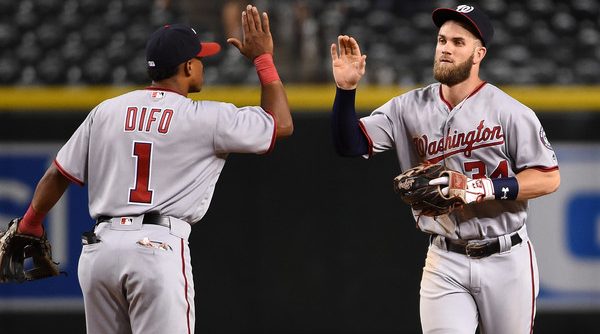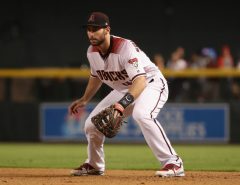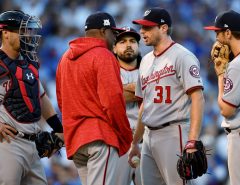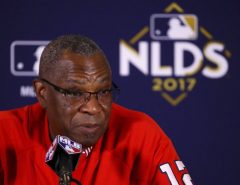To most of you, Wilmer Difo is a light-hitting utility infielder with goofy hair and even goofier walk-up music. But to a limited few, (probably just me, and Luigi de Guzman), he’s so much more. I dare not speak for Luigi (who’s more than capable of speaking for himself) but to me, he embodies the Washington Nationals past, present, and future. However, you can’t tell the story of Wilmer Difo without first telling the story of Carlos Alvarez, also known as Esmailyn “Smiley” Gonzalez.
In 2006, the Nationals gave Alvarez $1.4 million to make a splash in the talent-rich Dominican Republic under the assumption that he was a different person (Esmailyn Gonzalez) and 4 years younger than he actually was. $1.4M doesn’t sound like much considering the money being thrown around baseball today. It’s less than Chris Heisey will make this year, for instance. But that $1.4M changed the course of Nationals history. When the truth of Alvarez’s identity and age came to light in 2009, heads rolled. It led to the dismissal of then-General-Manager Jim Bowden and his advisor Jose Rijo, the promotion of Mike Rizzo and completely derailed the Nats’ international efforts to find new players.
Alvarez lied to get the money. Rijo helped broker the deal with Island buscones, who are part AAU coach, part player agent, and part human traffickers. Rijo and Bowden were suspected of taking kickbacks as part of the fraudulent deal. Both left the franchise in disgrace and then-assistant GM Rizzo ascended to begin his successful campaign to rebuild the organization from the inside out. But as a result of getting hoodwinked, the Nats pulled out of the Caribbean for years before reestablishing themselves with a new training facility and a different approach. Instead of spending big money on 16-year-old wunderkinds, they began seeking out older, cheaper players to mold. Think quantity over quality. One of those kids was Difo. He signed at age 18 for only $20,000 and became the first Dominican player to make the Nationals roster post-debacle.
Difo represents the first of a handful of Dominican success stories since the Alvarez/Gonzalez scandal, along with catcher Pedro Severino, traded pitcher Reynaldo Lopez, outfielder Rafael Bautista, and top prospect Victor Robles. Difo’s success in the minors and subsequent call-up to the majors in May 2015, vindicated the Nats’ rebuilt scouting department lead by Johnny DiPuglia and has lead to higher bonuses for better players, as well as a brand new baseball academy on the island.
Former WaPo writer James Wagner recounted Difo’s rags-to-riches story in winter before his Major League Debut. A late bloomer, he tore through the Nats minor leagues, showing both speed and power while playing solid defense in the middle of the diamond. He began 2015 in Potomac and was promoted to AA Harrisburg after only 19 games. When Jayson Werth went down with an injury, he was called up for the first time. He bounced between the minors and majors in 2015 and ’16 and was a surprise addition to the 2017 Opening Day roster. Stephen Drew‘s return from injury and Difo’s up-and-down performance at the plate means he’s a top candidate to be demoted this year. But that’s not what’s important about Difo. Simply contributing to the major league team has shown that the Nats can find value on an island that once burned them.
And so I cheer for him. For his goofy songs, his big smile, and for the (very) occasional solid play. Two summers ago the Nats once again gave a $1M+ contract to a 16-year-old when they gave Juan Soto $1.5M. Then they went crazy last summer, signing 19 players for over $5M, including $3.9M to shortstop Yasel Antuna. All because players like Difo and Severino and Robles had succeeded where Carlos Alvarez had failed.
Difo may never reach the potential he flashed in the minors as power and speed combination shortstop when he hit 14 home runs and stole 49 bases for Potomac in 2014. And if he does, he may not reach that potential in Washington – where he’s blocked by Daniel Murphy, Trea Turner, and Anthony Rendon. Without regular at-bats, he’s struggling to the tune of a .192/.259/.282 slash line while providing solid defense whenever a starting infielder needs a day off and whenever fans need oldies slow-jams to sing along with.
And so I cheer for Wilmer Difo. As does Luigi – who coined the #AreWeNotMen #WeAreDifo hashtags in reference to this incredible ’70s album by the band Devo. But if that’s not your cup of tea, then might I suggest you fire up Unchained Melody by the Righteous Brothers – Difo’s song of choice. Let’s, as a fan base, all 8th-grade-style slow dance with our Beardless Danny Espinosa while we can. Prospects come and prospects go. Yet Difo will always hold a special place in my heart – a heart broken by Smiley Gonzalez. Wilmer Difo showed me it was okay to love again. He showed Ted Lerner too.
So when the next international free agent takes the District by storm – be it Robles, Soto, Antuna, or somebody else – ask yourself in a non-gender specific way:
Are we not men?
For the answer will be the same as it is now:
We are Difo.
Tags: Jim Bowden, Juan Soto, Mike Rizzo, Nationals, Nats, Victor Robles, Washington Nationals, Wilmer Difo





Leave a Reply